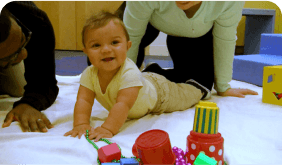Extracurricular activities like sports, music lessons, dance, or band are rewarding for children of all ages. Having a schedule and forming commitments to teams and clubs are wonderful for social development. However, if children are involved in too many extracurricular activities, they might miss the intended benefits of their activities and suffer from unneeded stress.
How do you know when your child is too busy?
Ask yourself these questions:
Do you feel too busy? Do you have time for other family members?
Is your child sleeping enough? Do they fall asleep at inopportune times? Do they have circles under their eyes?

Has your child’s schoolwork declined?
Do they put up a fight when they have to go to practice or meetings? Are they joyful when there are cancellations? Do they throw temper tantrums more than before they started an activity?
Do you still have time to enjoy family meals? Eating as a family is a great way to teach children about nutrition, routine, and ritual. Family meals might be just as important for children as extracurricular involvement.
Is there time to play? Free play is the most important non-academic activity in a child’s life. If their structured activities are eliminating their time to play, that’s an issue. Free play does not include time spent in front of a screen. See our blog post on the importance of play.
If many of these questions raised concerns for you, it might be time to simplify. We know if can be hard to find a good balance of extracurricular activities for your child, so here are a few tips on how to prioritize and capitalize on time commitments:
One At a Time
Think about trying out different sports or activities seasonally. For example, try swimming over the summer, and play soccer in the fall. Doing one sport per season let’s your child really focus and make the most of their experience.
Keep Motivation in Mind
It sounds silly, but it’s easy to forget why you do something. If your child is choosing between activities ask them which they enjoy the most, which they think they’re best at, and which they think about most often.
Practice Makes Perfect
It shouldn’t be hard to see if your child really enjoys an activity because they’ll likely practice it in their free time. When children find an activity they really like, they want to do it all the time. These are the activities you should help your child focus on.
Make Lifelong Friends
Encourage your child to hang out with their friends from sports teams or clubs. Social development is an important part of extracurriculars.
Choose Your Words Carefully
Sports, theater, dance, and other activities tend to have competitive jargon associated with them. When parents adopt this jargon they influence how their child sees the activity and themselves. Tell your kids you love to watch them play sports or music, that you love to see them practice, or it makes you happy to see them dance. Children start to identify themselves with the activities they do and it can be really unhealthy if their self worth is tied to how many goals they score.
Practice Slow Parenting
Try taking a morning off with your kids or skip the Saturday routine and get out of town. Plan an activity that does not have a scheduled end. Go for a walk without a destination and see what you find along the way. Give your kids the time to explore, be together, and have an adventure!





